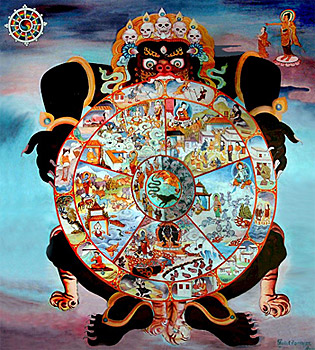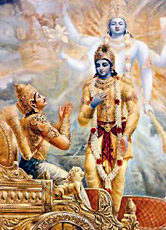In Indian philosophy , the influence of an individual`s past actions on his future lives or reincarnations. It is based on the conviction that the present life is only one in a chain of lives. The word Karma, has its roots in the Sanskrit word "Kriya", meaning, to act or to do or to make.It denotes both physical or mental action. Hence, thinking, a mental activity falls under the ambit of Karma. The concept of Karma has a greater connotation. It not only refers to the actions or deeds of the present life or Janma(birth) , but of the preceding or Purva Janma also.
Dharma or rules of righteousness formulates a code of actions or Karma for the observance of Dharma in Karma. Just as, Bhagavad Gita, focuses on the urgency to work without expectations or Nishkamya Bhava. Lord Krishna says: "Work incessantly. Your duty is to work but not to expect the fruits thereof."
Karma is governed by the threefold nature of man. Human nature is made of the aspects of Iccha, Jnana and Kriya. While, Iccha is desire or feeling. Jnana is the acquired knowledge. Kriya is willingness to act. So, an individual feels hungry. He then learns that food can satisfy his appetite. He, willing to collect food, starts preparing food through cooking. Behind the action, there are functions like desire and thought. A desire for an object grows in the mind. Then one speculates on how to procure it. The knowledge gathered (through thought), boost up the willingness to act for getting it.
Desire is thus followed by thought and thought is succeeded by action. Desire spawns Karma. One acts to possess the targets of desire. The scale of Dharma measures the quality or kind of Karma. One`s quality of Karma produces the fruits or Phala. If one commits a good deed, he is rewarded with pleasure. Thus the seeds of good intentions or desires are nurtured in the mind of a pious soul. And when the soul sows the plant of virtuous activity or Dharma, it will surely reap the sweet fruits of Punya or goodness. But if one indulges in Adharma to serve selfish interests, he is assaulted with pains or rotten fruits of Paap. This is the principal message, propagated by the Law of Karma.
 Karma experiences its aftermath in the next series of births. Karma is integral to the Wheel of Samsara, very much similar to the Western image of the Wheel of Fortune. The Sanskrit word Samsara means "the repeated passing of souls through different worlds- gross or subtle." The intricate web of Karma-Samsara network is well illustrated by the Brihadaranyaka Upanishad:
Karma experiences its aftermath in the next series of births. Karma is integral to the Wheel of Samsara, very much similar to the Western image of the Wheel of Fortune. The Sanskrit word Samsara means "the repeated passing of souls through different worlds- gross or subtle." The intricate web of Karma-Samsara network is well illustrated by the Brihadaranyaka Upanishad:
" When a caterpillar has come to the end of a blade of grass, it reaches out to another blade, and draws itself over to it. In the same way the soul, having coming to the end of one life, reaches out to another body, and draws itself over to it.
As people act, so they become. If their actions are good. they become good; if their actions are bad, they become bad. Good deeds purify those who perform them; bad deeds pollute those who perform them.
Thus we may say that we are what we desire. Our will springs from our desires; our actions spring from our will; and what we are, springs from our actions. We may conclude, therefore, that the state of our desires at the time of death determines our next life; we return to earth in order to satisfy those desires."
Hinduism therefore declares that the soul moves upwards and downwards on the ceaseless Wheel of Samsara. The Atman keeps on entering into one form of incarnation to another, during the cycle of birth, death and rebirth in a coherent sequel. The cycle of existence continues, till it completes the destined births as per as the harvest reaped by its Karma. It is thus evident that Karma determines the unseen fate or Adrishta of an Atman, as is voiced in an Indian Proverb: "Plant a thought and you will reap a deed, plant a deed and you will reap a habit, plant a habit and you will reap a character, plant a character and you will reap a fate."
This innate interrelation of the cosmic rules of Dharma and Karma, in the cycle of existence or Samsara corresponds to the scientific Law of Cause and Effect. Science advocates the natural law that the cause generates the effect and in accordance to the nature of the cause, the effect in turn creates an impact, be it positive or negative. In this respect we should certainly quote the observation of the famous anthroposophist Rudolf Steiner on the Law of Karma, in his "Manifestations of Karma" (1910):"...Without limiting free will of man, the law of karma acts back on an entity, from which the cause came, like the law of action and reaction."
Thus man exercises his Free Will to conduct his Karma, and Karma then shapes his Adrishta. Hinduism classifies Karma into three types: Sanchita (accumulated works), Prarabdha (fructifying works) and Kriyamana or Agami (present works). Sanchita is recommended as the sum total of all the assembled Karmas of the past. It is visible in the character of a person, in his habits, attitudes and aptitudes, abilities, preferences and cravings.
Prarabdha is that portion of the past Karma or Sanchita Karma, which fixes the current bodily, abode of the Atman. Prarabdha thus dictates the present life of the Atman. The Phala of Karma will be reaped inevitably. It is only exhausted through the cycle of Samsara.. One has to pay the past debts. Prarabdha Karma is that which has started to bear fruit. It is sorted out of the reserve of the Sanchita Karma. Kriyamana is that Karma which is performed to be utilising in the future. It is also called Agami or Vartamana.
The Vedas offer a fantastic analogy to demonstrate the Karma-types.
A granary of rice can be identified with the Sanchita Karma. The quantity of rice that is sold daily from the mass of the stored product, is Prarabdha. And the amount preserved for future sale is the Agami Karma.
The elimination of the entire assimilation of Sanchita Karma is feasible with the reception of the Supreme Consciousness of the Omnipresent Cosmic Spirit of Ishvara or God, the Brahman. This destruction of Sanchita Karma in Karma Yoga leads to Moksha .
Karma can be reformed with the elevation experienced in Karma Yoga. Karma Yoga is unconditional service rendered to the well being of every form of life or creature. Karma Yoga is the Yoga of action, which chastises the Antahkarana (the heart and the mind) and unites the mind, body and soul of the Jiva into a peaceful harmony, for the attainment of the Precious Divine Light and the Realization of the Self or Atman as sourced from Brahman.
A Karma Yogi is one who is fully engrossed in Karma Yoga. A Karma Yogi must free himself from the primal illusory attachment or Maya towards the worldly pleasures. He should never desire for fruits. Only then can he attend Moksha or freedom from the bondage of Samsara and shackles of Karma.
A Karma Yogi can practice Karma Yoga, by participating in welfare activities. One engages himself in Karma Yoga, by donating food to a starving, poor man. Again, curing the wound of a helpless animal is an example of Karma Yogi. It is so, because the Karma Yogi has recognized the life forms as reflections of Brahman. A Karma Yogi thanks the Jiva who has gifted him the opportunity to serve him.
Yajur Veda celebrates the Paradise that Karma Yoga ushers in: "Only by a tranquil mind does one destroy all action, good or bad.
 Once the self is pacified, one abides in the Self and attains everlasting bliss. If the mind becomes as firmly established in Brahman as it is usually attached to the sense objects, who, then, will not be released from bondage?"
Once the self is pacified, one abides in the Self and attains everlasting bliss. If the mind becomes as firmly established in Brahman as it is usually attached to the sense objects, who, then, will not be released from bondage?"
Moksha is embraced in that ethereal serenity of Karma Yoga, when the Indriyas or senses do not vex the mind or Manas by inflicting the thirst of longings. A peaceful detachment from the material pursuits of the world is arrived at through the marvelous prowess of the intellect or Buddhi. The Shanti that that pervades the body, soul (Atman) and mind of the Jiva, helps him to concentrate on the meditation of the Purest Consciousness of the Ultimate Reality, Brahman. Krishna in Bhagvad Gita enunciates the way of advancing towards and graduating into Moksha:
"mat-karma-krn mat -paramo mad -bhaktah sangah-varjitah
nirvairah sarva-bhuteshu yah sa mam eti pandava"
The English transliteration is as follows:
"O Arjuna, one who engages in actions for Me, considering me the Supreme goal, engaging in devotional service for Me, freed me from the contamination of fruitive activities and mental speculation, devoid of enemity towards any living entity; such a person attains Me."












